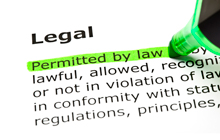PROTECTING COMMITTEES FROM LIABILITY
 QUESTION: I know that board members are legally protected but what about committee members (like a rules committee, newsletter committee, finance committee, etc.)? Are they also protected under the Civil and Corporations Code?
QUESTION: I know that board members are legally protected but what about committee members (like a rules committee, newsletter committee, finance committee, etc.)? Are they also protected under the Civil and Corporations Code?ANSWER: Unfortunately not. By statute, board members have a higher level of protection but the same is not true for committee members. They do, however, frequently have protections under the association's governing documents and and its insurance policy.
Advisory Role. One way to reduce potential liability is to make sure your committees are advisory only. Without decisionmaking authority, they make a much smaller target. Two exceptions to advisory-only committees are executive and architectural committees. The first is made up entirely of directors and the second derives its authority from the governing documents. The surest way to protect all volunteers is for the association to purchase insurance to cover them.
RECOMMENDATION: Proper D&O Insurance is a must. Make sure your association's policy covers committee members as well as board members. Adopt an ethics policy so committee members know what constitutes proper and improper behavior. And, adopt committee charters so members know they are advisory only. Finally, if your governing documents are silent about protections for committee members, you should consider amending your documents.
WHEN A DIRECTOR SUES
 QUESTION: Our HOA has only five owners and all owners are on the board. Can an owner, under the D&O coverage, sue the board for an issue as an individual owner? My thought is that you can't sue yourself, yet they wear two hats...board member and homeowner.
QUESTION: Our HOA has only five owners and all owners are on the board. Can an owner, under the D&O coverage, sue the board for an issue as an individual owner? My thought is that you can't sue yourself, yet they wear two hats...board member and homeowner. ANSWER: Yes, a director can sue his association. Your D&O insurance may deny coverage but it does not prevent him from suing.
Suing Himself. You're right that, as a practical matter, your fellow director is suing himself when he sues the association. He can do it because, from a legal perspective, he is not suing himself. He is suing a separate legal entity--the association.
ADR. Before your unhappy director can sue, he must first determine if the governing documents require binding arbitration rather than litigation. If so, he must follow the governing documents. If your documents are silent, the plaintiff can go into court. Depending on what he seeks and why, the Davis-Stirling Act may require that he first endeavor to submit the dispute to alternative dispute resolution.
Recusal. During the litigation, the plaintiff director must recuse himself from any discussions or votes related to his lawsuit. If he refuses, the board can form an executive committee (minus the plaintiff) to work with the association's attorney on the lawsuit. If the governing documents prohibit a director from serving while in litigation with the association, the board can vacate his seat.
Insurance. A consideration for the plaintiff is that the association's insurance may refuse to defend. Some insurance policies exclude coverage if one director sues another director. D&O insurance is designed to protect directors from third-party claims, not infighting between directors or claims against current or former directors for imprudent business practices. This is known as an “Insured vs. Insured” exclusion.
Special Assessment. If the carrier denies coverage, the membership could be specially assessed to raise the funds needed to defend against the action. If that happens, the plaintiff may find himself an outcast. He should be careful about pooing where he eats.
RECOMMENDATION: The board should avoid litigation and make every effort to work out their differences.
No comments:
Post a Comment